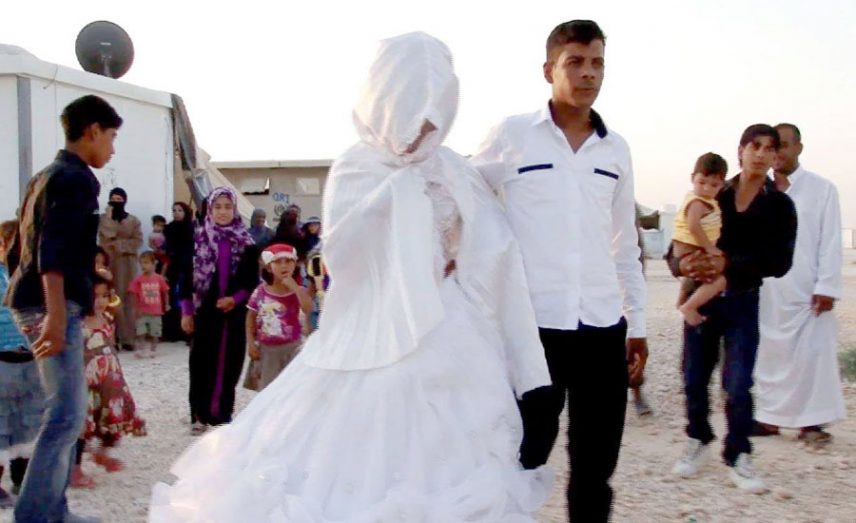Following the cease-fire agreement in southern Syria, areas of the Hauran Plain have seen a return of marriages, wedding customs and traditions, especially between young people. However, some barriers have prevented locals from openly practicing these rituals out of fear of sudden bombardment, especially after the recording of regime violations.
Obstacles before marriage
Due to the Assad regime’s bombardment of civilian homes and its continuous violations in the region, coupled with the waves of displacement, the rate of young people who want to marry has decreased as life priorities do not include marriage.
According to one of the administrative authorities in the area, the recent period has witnessed violations causing displacement of people that have begun to flock to nearby villages.
Mohamad al-Hariri, from the eastern countryside of Daraa, told Tamaddon: “We left our home and headed to one of the least bombarded villages after the house was damaged, which forced me to stop finishing marriage preparations. I fell into problems of displacement and securing shelter for my family.”
Hariri’s mother said: “We were preparing for Mohamad’s wedding for 25 years, such as purchasing a bedroom and wedding needs, but the bombardment of the house forced us to pause our plans for a bit and wait given the circumstances we are undergoing.”
Meanwhile, some other young people who are preparing to marry are continuing their preparations and are insistent on continuing despite the hardships and delays.
Jawad Abdullah, one of the young men from Hauran who is soon to be wed, said: “After our house was bombed, I lost the wedding necessities I’d brought, and I no longer had anything but my profession. We left the house, with anger at the Assad regime’s crimes filling our hearts, and headed to a displacement camp in the region, where we were able to obtain a house to rent for my family and prepare me for marriage.”
He added: “I started to gather the costs of marriage and prepare the necessities again, until I had finished everything and was able to marry.” He said that after the cease-fire and the relative calm, an atmosphere of joy was restored to Hauran along with the wedding rituals and customs.
Abdullah was not the only one to marry, as Ghazwan al-Aqil from the city of Daraa points out: “There is an insistence among some young people who want to marry to recover the wedding rituals among people and to bring them into the homes of Syrian families while reviving familiar customs in Hauran.”
Aqil described the atmosphere of the marriage by saying: “The ceremonies begin with the groom’s family two days before the marriage procession, with an atmosphere of singing in the attendance of the groom’s relatives, and then after this there is a town-wide celebration, attended by local notables and friends from different villages, with more singing after this, followed by the marriage procession.”
Differences in view remain
Abdullah Abou Mohamad, 40, is one of the people most opposed to weddings, which has led to rifts with residents of his villages.
He told Tamaddon: “I was arrested by the Assad regime, and I spent a full year being tortured and beaten before they released me after paying a sum of 3 million [Syrian] pounds. My children were hit in a battle against regime forces, and I stayed with my wife in a home filled with sadness after losing our children.”
As such, he explained, “it’s necessary to abstain from setting up any form of marriage ritual, as every day a Syrian loses his son or brother or neighbor, and it is difficult to bring joy into the hearts of people filled with grief.”
Legal avenues on the liberated side
Many youths remain only in the liberated areas as a result of the large number of young people wanted for military service by the regime forces. A large number of these struggled to escape the regime’s prisons and will not return to these areas out of fear of being arrested again. This has had a negative effect on those who are married as they cannot legally establish their unions, whether their marriage was legitimate or not.
However, the issue developed after some time with brokers, or so-called "transaction expeditors," who have begun working on legally establishing young people’s marriages in exchange for money paid to regime henchmen.
In the beginning, marriage in the liberated areas was limited to Shariah contracts. However, the issue of establishing the marriage has become easier, with "expeditors" working to trace the transactions in their various forms.
The phenomenon of brokers has spread in all areas, which has helped wanted people in liberated areas to conduct their dealings while opening a new door for regime employees to make money.
This article was translated and edited by The Syrian Observer. Responsibility for the information and views set out in this article lies entirely with the author.


